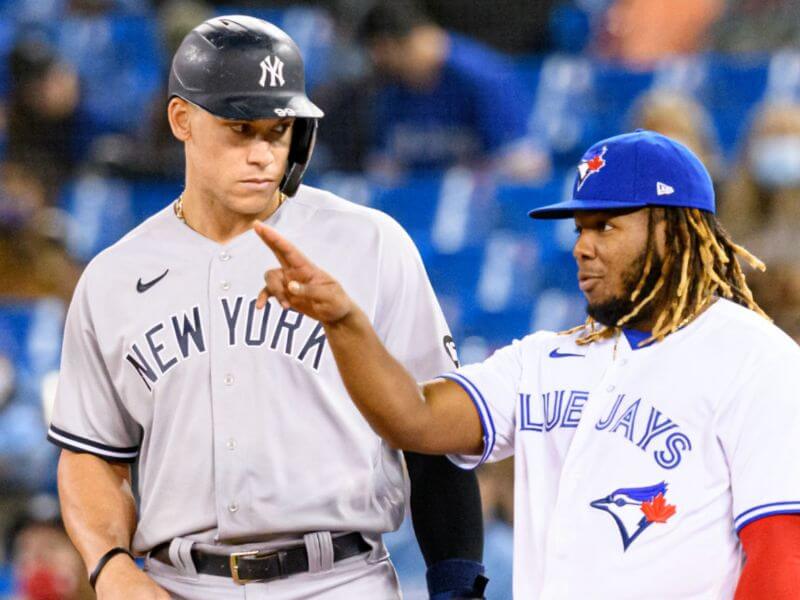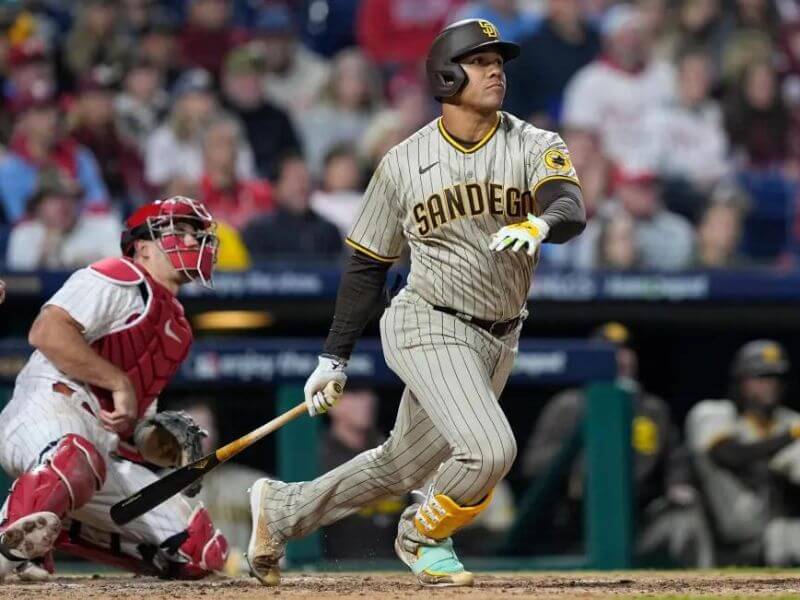What is arbitration baseball ? For the uninitiated baseball fan, players are either free agents or not. But tucked neatly amid the litany of MLB labor laws is salary arbitration — a process that happens during the dead part of winter, between the Winter Meetings and spring training.
In February, teams and players will sit down to discuss salary numbers for the upcoming season, and there’s a process to it:
What is MLB arbitration?
Arbitration is what happens when a player and team cannot agree on a salary number for the upcoming season. A hearing is held between the club and the player, which is heard by independent arbitors. Then, the arbitors rule in favor of the player or the club.

MLB arbitration rules
Should a player not have a contract for the upcoming season, and the club tender a contract, the player and club must agree on a salary number. Both parties have to agree to a number by mid-January.
Should the player and the club not agree on a salary number for the upcoming season, then the team and player go to salary arbitration. The player and team both file a salary number they feel is appropriate, mostly based on the salaries of players of similar ilk and production over recent years.
In a hearing in February, a panel of independent arbitors hears the case and rules either in favor of the player or the team.
Oftentimes, a player and the team will agree on a salary number before officially going to arbitration, and in recent years franchises have tended to sign players to extensions, often “buying out” years of arbitration and sometimes free-agency years.
Typically, players get raises during the arbitration process, but their salaries cannot be cut more than 20 percent in relation to the prior year.
Who is eligible for arbitration?
MLB salary arbitration is reserved for players who have at least three years of MLB service time but are not yet eligible for free agency, which is earned after six years of MLB service time.
In certain cases, players who reach a certain service-time threshold are eligible for arbitration a year earlier — this is known as a Super Two player.
What is a Super Two player?
A Super Two player is a player who has more than two but fewer than three years of MLB service time — that’s time spent on a 25-man roster or the MLB Injured List — but ranks in the top 22 percent of service time is pooled with players who are arbitration eligible, thus accelerating the player’s arbitration clock, giving him an extra year of arbitration.
The cutoff date for Super Two eligibility varies from year to year, depending on when that top 22 percent was called up/placed on a 25-man roster. In 2019, the Super Two cutoff was placed at two years, 115 days of service time, the earliest cutoff in years.
Benefits of salary arbitration
Players on their rookie contracts have no leverage when it comes to salary, meaning the club sets the player’s salary as it sees fit (usually around league minimum). Arbitration-eligible players are more fairly paid for their contributions to their major league squad, and for the first time have a say in their salary.
Cons of salary arbitration
Arbitration can be a messy, vicious process; teams are trying to prove the player is worth less than what he believes he’s worth, while the player is trying to earn a raise in the years leading up to free agency.
In recent years, Trevor Bauer, Marcus Stroman and Dellin Betances have been outspoken on the process, citing teams’ negativity and desire to denigrate the player during the process.
What is Arbitration in MLB?
Major League Baseball (MLB) has a unique process for determining the salaries of certain players, known as salary arbitration. This method comes into play for players who have three or more years of Major League service but less than six years, and are not under contract for the upcoming season.
The purpose of salary arbitration is to resolve salary disputes between players and their respective teams, ensuring that these athletes are compensated fairly based on their performance and contributions to the team.
Arbitration in MLB is unlike standard negotiations, with both player and team submitting their proposed salary figures to a neutral arbitration panel composed of three members.
This panel listens to arguments from each side, assessing the player’s worth based on factors such as past performance, team contribution, and comparison to other similar players in the league.
After careful deliberation, the panel chooses one of the submitted figures, and the decision is binding for the upcoming season.
This process promotes fairness in salary determination and encourages teams and players to reach an agreement, aiming to reduce the use of arbitration hearings as an option of last resort.
While not all players are eligible for salary arbitration, it serves as an essential tool in the MLB landscape to ensure equitable pay for eligible players while maintaining a balanced relationship between players and their teams.
What Is Arbitration
Arbitration in MLB refers to a process that takes place when a team and a player cannot agree on the salary for the upcoming season.
This usually involves players who have three or more years of Major League service but less than six years of Major League service.
If an agreement is not reached, a hearing is conducted between the club and the player, with an independent arbitrator making the final decision.
Origin
The origin of MLB arbitration dates back to 1974 when the players’ union and the team owners settled on a new labor agreement that included a binding arbitration process.
This was implemented as a method for resolving salary disputes and major league players, who could not agree on a contract with their respective teams.
The goal was to provide a neutral and fair avenue for determining salaries based on the player’s performance, previous pay, and overall market value in comparison to other similar players.
Rationale
The rationale behind MLB arbitration is to provide a cost-effective, efficient, and impartial way to resolve salary disputes between players and teams.
Traditional litigation was considered time-consuming and costly for both parties. The arbitration process is generally faster and less expensive than traditional litigation.
It also protects players from being underpaid, ensuring they receive fair compensation for their skills and performance.
Meanwhile, it prevents teams from overpaying players, maintaining a balanced and competitive environment within the league. The arbitrator’s decision is binding and cannot be appealed, providing a final resolution for both parties involved – the player and the team.
Arbitration Process in MLB
Eligibility Criteria
In Major League Baseball, arbitration is a process to determine the salary of a player who has not yet reached free agency and is not under a long-term contract. The eligibility criteria for a player to go through arbitration include:
The player has completed at least three but no more than six years of MLB service time.
The player is classified as a “Super Two” player, meaning they rank in the top 22% of players with between two and three years of service time.
Filing for Arbitration
If a player meets the eligibility criteria, they can file for arbitration. The filing process typically occurs in mid-January. Both the club and the player must submit their proposed salary figures for the upcoming season. The player’s salary can be reduced, but it cannot be cut by more than 20%.
Salary Negotiations
During the salary negotiation process, the player and the team representatives will discuss and attempt to agree on the salary for the upcoming season. Both parties have the opportunity to present their arguments and provide supporting data to validate their proposed salary figures.
If the negotiations are unable to reach a resolution, the case proceeds to an arbitration hearing.
Arbitration Hearings
Arbitration hearings involve a panel of three independent arbitrators who hear arguments from both the player and the team.
Both parties present their case, highlighting the player’s performance, performance of similar players, and proposed salary figures.
After the hearing, the arbitrators choose either the salary figure submitted by the player or the team.
These decisions are final, and the player’s salary is set for the upcoming season. In most cases, the parties often come to a settlement agreement before the hearings, avoiding the need for arbitration.

Impact of Arbitration on MLB
Effects on Player Salaries
Arbitration in MLB plays a significant role in determining player salaries. When a qualifying player and a team cannot agree on a salary for the upcoming season, they can enter arbitration.
In this process, both parties submit their proposed salary figures, and an arbitrator will choose one amount or the other, based on the evidence provided.
This final-offer arbitration system can sometimes result in significant salary increases for players, as the arbitrator determines which amount is more reasonable based on the player’s performance and comparable salaries of other players.
Influences on Team Budgets
The arbitration process also affects team budgets. Since the final salary decision lies with the arbitrator, teams must consider the potential outcomes and their impact on the overall payroll.
Teams may also need to make adjustments to their rosters, trading or releasing players to accommodate the arbitrator’s decision regarding an arbitration-eligible player’s salary. Consequently, the arbitration process can directly influence team strategies and budgets throughout the season.
Decisions on Player Retention and Free Agency
Arbitration can also alter a team’s decisions on retaining or releasing players. Given the potential for salary increases through arbitration, some teams may choose to trade or release an arbitration-eligible player if they believe the potential salary increase may not align with the team’s budget or the player’s performance.
On the flip side, players who win significant salary increases through arbitration may be viewed as valuable assets by other teams, leading to potential trades or influence in the player’s future free agency decisions
Above is information what is arbitration baseball. Hopefully, through the above content, you have a more detailed understanding of what is arbitration baseball .Thank you for reading our post.









